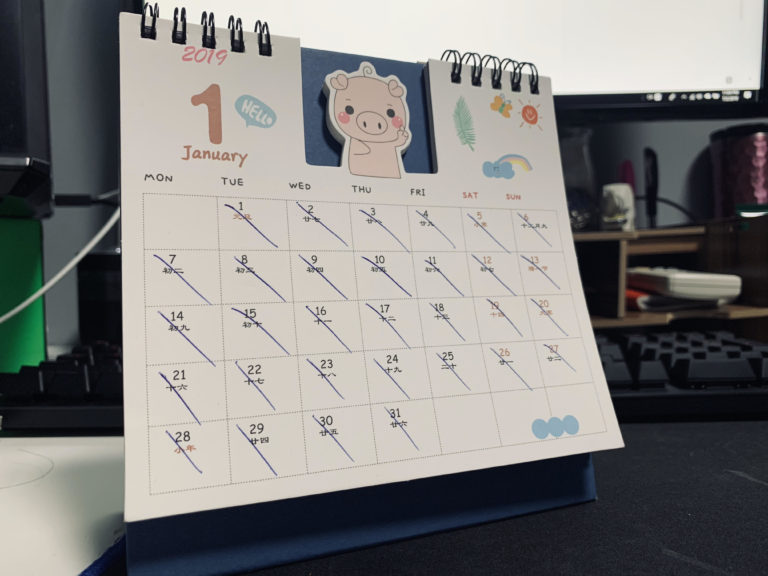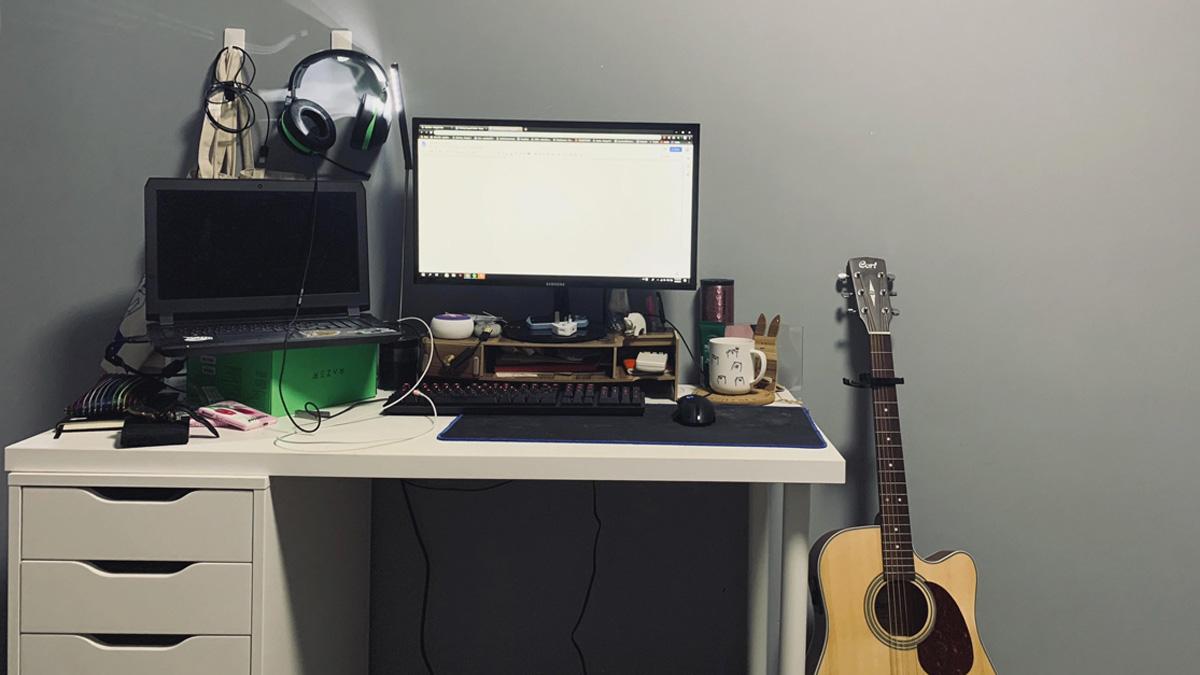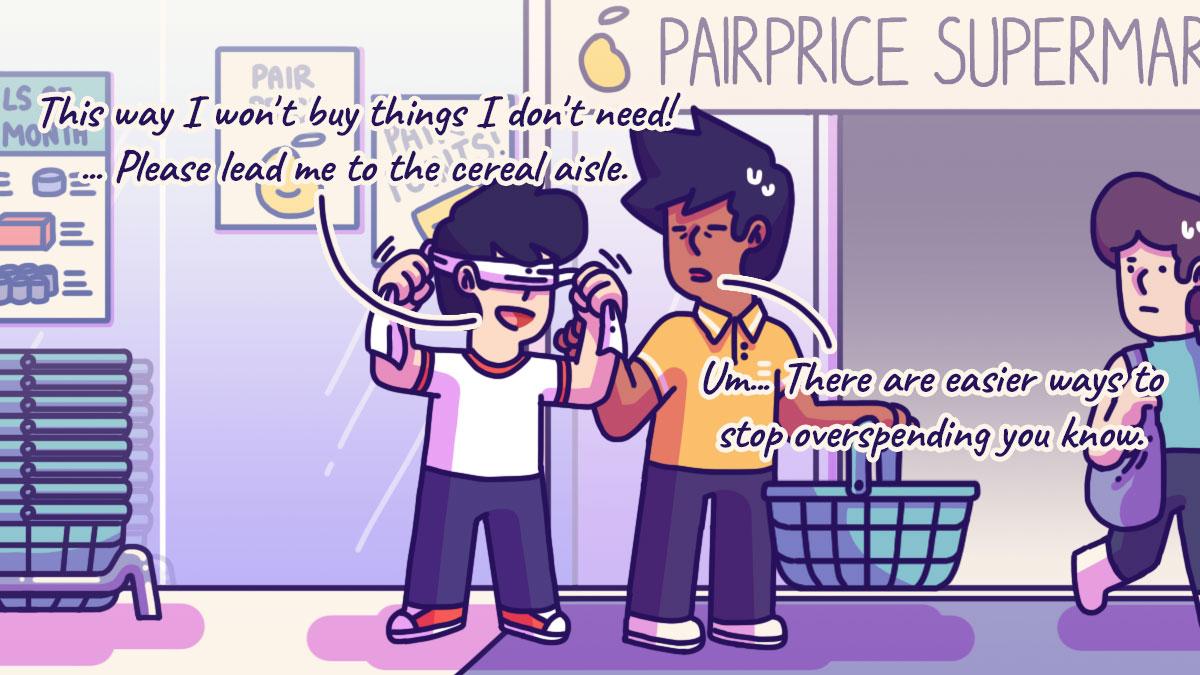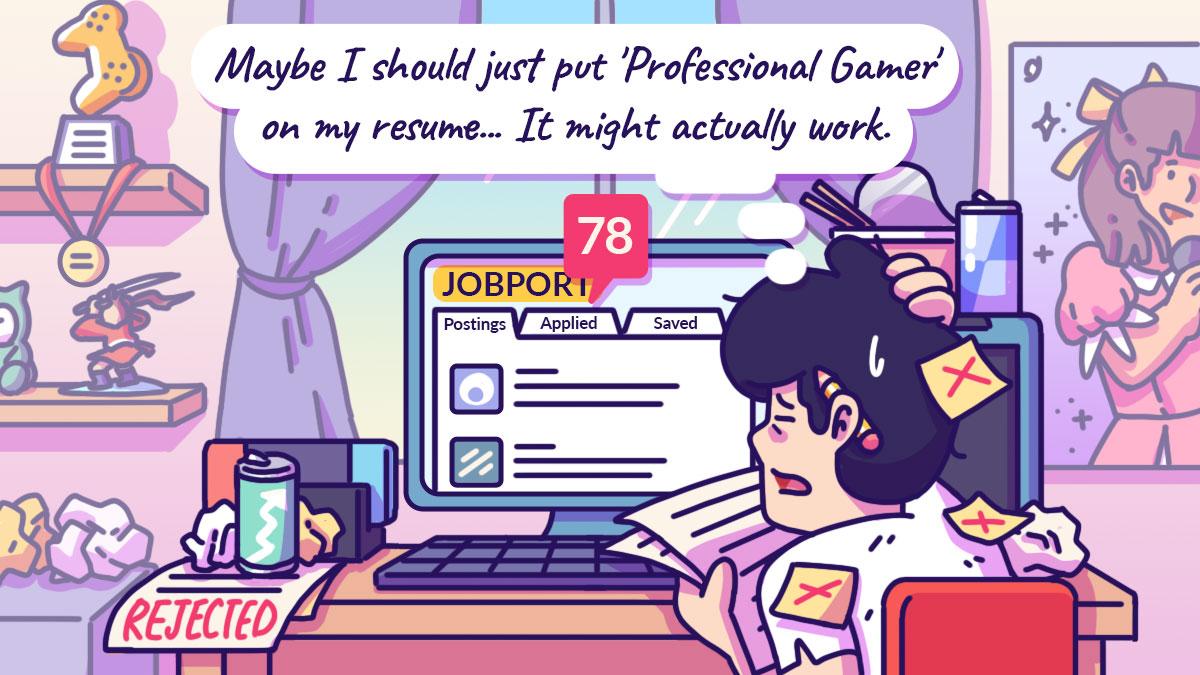Freelancing seems to be synonymous with having lots of free (hah!) time, being in charge of your own schedules, and rolling in the piles of money you’re making every month.Well, that’s not always the case. Reality is a bitter pill. I took a huge risk in 2018 and left my full-time job to become a freelance copywriter and content creator and found that it wasn’t always sunshine and rainbows.Here are some of my most impactful lessons from an entire year of the grind.
Lesson 1: Working from home isn’t for the weak-willed
I know what you’re thinking: being able to work at home sounds like a total dream. And while it might be, it can just as quickly turn into a nightmare if you’re not careful. When people ask me about what it’s like to work remotely as a freelancer, I always bring up the issue of the bed before all else:
[caption id="attachment_5251" align="aligncenter" width="768"]

The black hole of productivity.[/caption]
Never ever work in your bedroom. And I really do mean
never.
Because you don’t have an office to report to every day, certain guidelines (like clocking in by 9.30AM and having a workspace to yourself) no longer apply. So, it’s important to set some physical boundaries for yourself.
What I did was set up a home office in the study, making it as productive a space as possible. After getting into the groove of working in the home office, I took less naps and did more work.
Lesson 2: Time WILL fly, and you WILL have to run after it
It should be known that a freelancer’s pipeline of work
will be volatile. The lack of momentum in less eventful months might cause you to lose track of time or let the days slip away easily. It’s important to have the mindset of a worker bee, constantly on the lookout for new gigs or working on existing projects.
While remote working does have undeniable benefits, like playing with your cat whenever you want, or doing away with office wear, but with great freedom also comes great loopholes.
[caption id="attachment_5250" align="aligncenter" width="768"]

Yet another black hole of productivity. Argh.[/caption]
Always be mindful of the present, and consistently plan out a pipeline of work that will keep you busy and fed.
Lesson 3: You’ll start some days later than you want to, and that’s OK
[caption id="attachment_5249" align="aligncenter" width="300"]

If I keep staring at my watch, time will pass slower, right?[/caption]
In the past year, the grind got to me more than once. Mental exhaustion, burnout, and stress were major factors that affected my sleeping schedule and overall well-being. (Whoever told you that freelancers have it easier lied to you.) If I wasn’t fretting about a tough project, then I was fretting about how to manage my finances well enough to pay the bills.
As a result, somedays I would only get out of bed around 11AM and get to work… on fixing up some lunch. Then I’d chew through the meal while thinking about work, warming up the laptop, and finally looking through my drafts for comments and feedback.
Days like these are totally acceptable. They aren’t reflections of your work ethic or who you are as a person, so take a breather. Relax. If you want to produce your best work, you need to be your best self.
Lesson 4: You’ll have good months, and you’ll have the downright ugly
One month you’ll be drowning in work and projects and the next, it’ll all be drier than the Sahara Desert. Maybe your regular clients don’t have any work for you – or you don’t have clients you consider regular. Whatever it is, dry periods are part and parcel of life as a beginner freelancer.
When these uneventful months hit, it’s important not to spiral into an ocean of anxious thoughts at home.
[caption id="attachment_5248" align="aligncenter" width="768"]

Does that pig look anxious, or is that just me?[/caption]
My personal experience with dry months range from absolute frustration (“Where’s the money going to come from?”) to a state of zen (“I can control what I do with each day as I look for more jobs, even if I’m broke!”), but it’s taught me a lot about how to look ahead and forecast the amount of work I’ll be taking on.
Rule of thumb: If you expect the next month to be much less productive, manage your budget accordingly to prepare for a smaller pool of income.
Lesson 5: Declining gigs won’t mean the end of the world
This seems counterintuitive to my previous point, better to shore up the good months right?
But before you get all up in my face and insist that turning down jobs is bad for business in the long run,
stop.
Declining job offers as a freelancer won’t spell career death for you. After all, if you’re good, it’ll soon become obvious to those around you – and their associates, so they will be back.
I’ve had to refuse gigs in the past because my plate was just overloaded with jobs, but I haven’t suffered great income losses because I had to turn those down. I still managed to find work with regular clients who trusted me and through new clients I was referred to.
Lesson 6: Don’t take on more than you can handle in a month
Which brings me to my next point
[caption id="attachment_5247" align="aligncenter" width="499"]

I did this to myself.[/caption]
Don’t be greedy for jobs.
Something I used to do in 2018 was passing along job offers to friends or other freelancers I knew who were looking for work. If you’re up to your neck in work, taking on additional jobs won’t make things any easier for you. If you’re spread thin across a hundred projects, the quality of your work will take a huge nosedive. I promise.
Keeping a circle of freelancers and clients close at hand will be handy in the long-term. If you pass jobs along to others, they’ll remember this act of goodwill. When the time comes, job offers will come rolling back to you. It’s the circle of (freelance) life.
Lesson 7: Roll in money, then manage it well
There were several dry months I had to endure, as I mentioned earlier, and that basically meant being really short on resources and cash every now and then. The littlest things like stray indulgences in hobbies or getting a fancy meal now and then started to matter a whole lot more to me.
Keep an eye on what you’re spending on and really ask yourself if these occasional treat-yo-self moments are within reason (and your budget, duh). You need to know where each dollar is going, and whether that purchase is truly necessary.
That’s right – you might have to wait a little longer for the Switch.
Lesson 8: Never accept payment in the form of “exposure”
It might surprise you, but there are still people out there who believe creative work can and should still be paid for in “lots of exposure to our wide client base!”

I can’t count the number of times I was offered interesting work, only to have the conversation come to an abrupt end as potential clients dropped the dreaded E word.
Love yourself. Exposure won’t pay for your meals or bills.
Lesson 9: You deserve the rates you’re charging
[caption id="attachment_5245" align="aligncenter" width="480"]

That’s right. Cough it up.[/caption]
Never back down from the rates you want to charge,
especially if a project feels too big and intimidating for you to take on. If a client is open to the idea of hiring you as a freelancer, there’s a good chance they believe you’re capable of it. After all, they’ve seen your portfolio!
I’ve had a couple of instances where I considered lowering my rates to make myself look more “attractive” as a freelancer.
Mostly, I was wrong about this.
Always remember that the rates you’re charging are not unreasonable.Figure out how much monthly expenses are going to be, take into consideration any big ticket items coming up, and adjust your rates accordingly. Time is money, so don’t cheapen yourself!
Lesson 10: Treat all your clients well – even the worst ones
[caption id="" align="aligncenter" width="245"]

Manners maketh man. For real.[/caption]
As a freelancer, you’ll likely get to dip your feet into a wide range of projects and gigs if you work at it long enough.
Needless to say, these jobs didn’t all come from the same client. I met many people in 2018, some of whom were a little more difficult to deal with than the others. But how I felt about them didn’t matter, I soon learned.
All I was paid to do was, after all, the job. And being a freelancer, the only thing I needed to effectively market was myself. That meant establishing and maintaining healthy working relationships – especially since I was looking for recurring work.
So be nice. Even to those who don’t seem like they deserve it. Even the “do-it-for-the-exposure” clients, because one day, they might get a proper budget to pay you fairly for a project.
Lesson 11: Communication is key
When you’re working home alone most of the time, it can be easy to fall into an abyss of your own making. After all, if no one’s at home with you, there’s no one to interact with on a daily basis – at least until after the sun sets, when your friends and family get off their
real jobs.
It’s important to remind yourself constantly that you’re not actually working in a vacuum. A little human interaction goes a long way.
[caption id="attachment_5244" align="aligncenter" width="768"]

For the last time, it’s not “revert.”[/caption]
That, and you need to be communicative to keep yourself – and your client – up to speed on the progress of your work. If you predict possible delays in meeting deadlines, let them know as early as possible. People appreciate being kept in the loop!
Lesson 12: Draw up your freelancer contract – and always use it
I recently got paid for a magazine gig this month… but I completed the job in October last year. That’s four whole months of waiting for a measly sum of $180. Even though it wasn’t anything exorbitant, that sum of money still mattered to me
[caption id="" align="aligncenter" width="480"]

EXACTLY.[/caption]
I hadn’t thought to draw up a contract for myself because I’d worked with them before, but when Christmas swung by and my bank account balance remained unchanged, I was beginning to feel a huge wave of regret.
Many other freelancers I knew recommended going in with contracts at the ready, clearly stating the expected date of payment. It’s not for frills.
Summary – here are my most important takeaways for you:
- Protect yourself as a freelancer with contracts and timely invoices
- Manage your finances well every month and always save for a rainy day if you don’t always have plenty of job offers
- Never accept jobs that pay you only in exposure
- Pass along job offers to other freelancers if you have too much on your plate; future gigs will come back to you
- Time management and discipline at home (if you hate working in noisy cafes) are keys to your success
Got any tips on how to be a better freelancer? Share your nuggets of wisdom on our
social media today!
 The black hole of productivity.[/caption]
Never ever work in your bedroom. And I really do mean never.
Because you don’t have an office to report to every day, certain guidelines (like clocking in by 9.30AM and having a workspace to yourself) no longer apply. So, it’s important to set some physical boundaries for yourself.
What I did was set up a home office in the study, making it as productive a space as possible. After getting into the groove of working in the home office, I took less naps and did more work.
The black hole of productivity.[/caption]
Never ever work in your bedroom. And I really do mean never.
Because you don’t have an office to report to every day, certain guidelines (like clocking in by 9.30AM and having a workspace to yourself) no longer apply. So, it’s important to set some physical boundaries for yourself.
What I did was set up a home office in the study, making it as productive a space as possible. After getting into the groove of working in the home office, I took less naps and did more work. Yet another black hole of productivity. Argh.[/caption]
Always be mindful of the present, and consistently plan out a pipeline of work that will keep you busy and fed.
Yet another black hole of productivity. Argh.[/caption]
Always be mindful of the present, and consistently plan out a pipeline of work that will keep you busy and fed. If I keep staring at my watch, time will pass slower, right?[/caption]
In the past year, the grind got to me more than once. Mental exhaustion, burnout, and stress were major factors that affected my sleeping schedule and overall well-being. (Whoever told you that freelancers have it easier lied to you.) If I wasn’t fretting about a tough project, then I was fretting about how to manage my finances well enough to pay the bills.
As a result, somedays I would only get out of bed around 11AM and get to work… on fixing up some lunch. Then I’d chew through the meal while thinking about work, warming up the laptop, and finally looking through my drafts for comments and feedback.
Days like these are totally acceptable. They aren’t reflections of your work ethic or who you are as a person, so take a breather. Relax. If you want to produce your best work, you need to be your best self.
If I keep staring at my watch, time will pass slower, right?[/caption]
In the past year, the grind got to me more than once. Mental exhaustion, burnout, and stress were major factors that affected my sleeping schedule and overall well-being. (Whoever told you that freelancers have it easier lied to you.) If I wasn’t fretting about a tough project, then I was fretting about how to manage my finances well enough to pay the bills.
As a result, somedays I would only get out of bed around 11AM and get to work… on fixing up some lunch. Then I’d chew through the meal while thinking about work, warming up the laptop, and finally looking through my drafts for comments and feedback.
Days like these are totally acceptable. They aren’t reflections of your work ethic or who you are as a person, so take a breather. Relax. If you want to produce your best work, you need to be your best self. Does that pig look anxious, or is that just me?[/caption]
My personal experience with dry months range from absolute frustration (“Where’s the money going to come from?”) to a state of zen (“I can control what I do with each day as I look for more jobs, even if I’m broke!”), but it’s taught me a lot about how to look ahead and forecast the amount of work I’ll be taking on.
Rule of thumb: If you expect the next month to be much less productive, manage your budget accordingly to prepare for a smaller pool of income.
Does that pig look anxious, or is that just me?[/caption]
My personal experience with dry months range from absolute frustration (“Where’s the money going to come from?”) to a state of zen (“I can control what I do with each day as I look for more jobs, even if I’m broke!”), but it’s taught me a lot about how to look ahead and forecast the amount of work I’ll be taking on.
Rule of thumb: If you expect the next month to be much less productive, manage your budget accordingly to prepare for a smaller pool of income. I did this to myself.[/caption]
Don’t be greedy for jobs.
Something I used to do in 2018 was passing along job offers to friends or other freelancers I knew who were looking for work. If you’re up to your neck in work, taking on additional jobs won’t make things any easier for you. If you’re spread thin across a hundred projects, the quality of your work will take a huge nosedive. I promise.
Keeping a circle of freelancers and clients close at hand will be handy in the long-term. If you pass jobs along to others, they’ll remember this act of goodwill. When the time comes, job offers will come rolling back to you. It’s the circle of (freelance) life.
I did this to myself.[/caption]
Don’t be greedy for jobs.
Something I used to do in 2018 was passing along job offers to friends or other freelancers I knew who were looking for work. If you’re up to your neck in work, taking on additional jobs won’t make things any easier for you. If you’re spread thin across a hundred projects, the quality of your work will take a huge nosedive. I promise.
Keeping a circle of freelancers and clients close at hand will be handy in the long-term. If you pass jobs along to others, they’ll remember this act of goodwill. When the time comes, job offers will come rolling back to you. It’s the circle of (freelance) life. I can’t count the number of times I was offered interesting work, only to have the conversation come to an abrupt end as potential clients dropped the dreaded E word.
Love yourself. Exposure won’t pay for your meals or bills.
I can’t count the number of times I was offered interesting work, only to have the conversation come to an abrupt end as potential clients dropped the dreaded E word.
Love yourself. Exposure won’t pay for your meals or bills. That’s right. Cough it up.[/caption]
Never back down from the rates you want to charge, especially if a project feels too big and intimidating for you to take on. If a client is open to the idea of hiring you as a freelancer, there’s a good chance they believe you’re capable of it. After all, they’ve seen your portfolio!
I’ve had a couple of instances where I considered lowering my rates to make myself look more “attractive” as a freelancer.
Mostly, I was wrong about this.
Always remember that the rates you’re charging are not unreasonable.Figure out how much monthly expenses are going to be, take into consideration any big ticket items coming up, and adjust your rates accordingly. Time is money, so don’t cheapen yourself!
That’s right. Cough it up.[/caption]
Never back down from the rates you want to charge, especially if a project feels too big and intimidating for you to take on. If a client is open to the idea of hiring you as a freelancer, there’s a good chance they believe you’re capable of it. After all, they’ve seen your portfolio!
I’ve had a couple of instances where I considered lowering my rates to make myself look more “attractive” as a freelancer.
Mostly, I was wrong about this.
Always remember that the rates you’re charging are not unreasonable.Figure out how much monthly expenses are going to be, take into consideration any big ticket items coming up, and adjust your rates accordingly. Time is money, so don’t cheapen yourself! Manners maketh man. For real.[/caption]
As a freelancer, you’ll likely get to dip your feet into a wide range of projects and gigs if you work at it long enough.
Needless to say, these jobs didn’t all come from the same client. I met many people in 2018, some of whom were a little more difficult to deal with than the others. But how I felt about them didn’t matter, I soon learned.
All I was paid to do was, after all, the job. And being a freelancer, the only thing I needed to effectively market was myself. That meant establishing and maintaining healthy working relationships – especially since I was looking for recurring work.
So be nice. Even to those who don’t seem like they deserve it. Even the “do-it-for-the-exposure” clients, because one day, they might get a proper budget to pay you fairly for a project.
Manners maketh man. For real.[/caption]
As a freelancer, you’ll likely get to dip your feet into a wide range of projects and gigs if you work at it long enough.
Needless to say, these jobs didn’t all come from the same client. I met many people in 2018, some of whom were a little more difficult to deal with than the others. But how I felt about them didn’t matter, I soon learned.
All I was paid to do was, after all, the job. And being a freelancer, the only thing I needed to effectively market was myself. That meant establishing and maintaining healthy working relationships – especially since I was looking for recurring work.
So be nice. Even to those who don’t seem like they deserve it. Even the “do-it-for-the-exposure” clients, because one day, they might get a proper budget to pay you fairly for a project. For the last time, it’s not “revert.”[/caption]
That, and you need to be communicative to keep yourself – and your client – up to speed on the progress of your work. If you predict possible delays in meeting deadlines, let them know as early as possible. People appreciate being kept in the loop!
For the last time, it’s not “revert.”[/caption]
That, and you need to be communicative to keep yourself – and your client – up to speed on the progress of your work. If you predict possible delays in meeting deadlines, let them know as early as possible. People appreciate being kept in the loop! EXACTLY.[/caption]
I hadn’t thought to draw up a contract for myself because I’d worked with them before, but when Christmas swung by and my bank account balance remained unchanged, I was beginning to feel a huge wave of regret.
Many other freelancers I knew recommended going in with contracts at the ready, clearly stating the expected date of payment. It’s not for frills.
Summary – here are my most important takeaways for you:
EXACTLY.[/caption]
I hadn’t thought to draw up a contract for myself because I’d worked with them before, but when Christmas swung by and my bank account balance remained unchanged, I was beginning to feel a huge wave of regret.
Many other freelancers I knew recommended going in with contracts at the ready, clearly stating the expected date of payment. It’s not for frills.
Summary – here are my most important takeaways for you:











